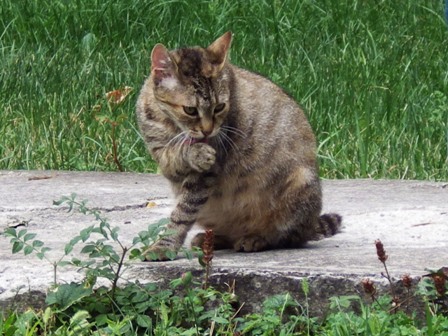Why Do Cats Lick Themselves?
Why Do Cats Lick Themselves?
The cats are known as the extremely clean animals that can take care of themselves. They spend the greater part of their waking hours on licking. Observed from our human perspective, the habit of licking classifies the cats in a category of extremely clean animals. However, that is completely human understanding of cats licking that grows into one more myth about cats. Anyway, a lot of evidence on cats’ grooming is available today and they show much more reasons why the cats licking themselves, that overshadows this common belief of compulsive hygiene. In the article “Why Do Cats Constantly Groom Themselves?” Jennifer Viegas, the managing editor of TheDailyCat, lists the common reasons of cats’ grooming.
Why Do Cats Lick Themselves?
Adult cats spend up to 50 percent of their waking hours grooming, according to Dr. Cynthia McManis, a veterinarian and the owner of Just Cats Veterinary Services.
Since grooming is so important to your cat, too much or too little can indicate a number of health problems. McManis explains why cats are constantly grooming:
• Protection against predators: Cats instinctively clean away food and additional odor-causing agents so they will not be detected by potentially threatening animals.
• Cooling down: Cats sweat a little from their paws, but they mostly rely on saliva evaporation on their fur to maintain normal body temperature. Grooming controls around one-third of a cat’s cooling process.
• Fur maintenance and warmth: By licking itself, a cat helps distribute its natural oils evenly around its coat. This oil guards against dampness and seals in heat.
• Nail care: Grooming helps your cat to sharpen and maintain its claws.
• Self-medicating: Cat saliva is thought to contain enzymes that turn it into a natural antibiotic. If your cat licks a wound, it may be guarding against infection. Always see your veterinarian if your cat sustains an injury.
• Relaxation: Cats take comfort in the ritual of self-cleaning.
• Stimulation of blood flow: Similar to how a hairbrush promotes blood flow on the scalp, your cat’s tongue — which is covered in tiny, bristle-like hairs — improves circulation.
• Friendship: Familiar cats will groom each other as a sign of affection. Think of it as a kitty kiss, since it involves saliva exchange and mutual trust.
Further in the article it has been explained how the two extremes – on too little or too much grooming – can indicate other possible problems that lie beneath the surface.
Too Little Grooming
Since there are so many benefits to grooming, an unkempt cat is probably a sick cat, according to Dr. Jane Brunt, a veterinarian at the Cat Hospital at Towson, in Baltimore. “Look for dullness of the fur, a buildup of undercoat, dander and even hairballs that, contrary to popular belief, are not normal for cats,” she says. If your cat has a hairball more than twice or so a year, it could be suffering from any number of internal problems. “And hacking could be a symptom of heartworm, lung disease, asthma or other serious issues,” she adds.
Too Much Grooming
When the volume of hair loss is excessive, there can be a “lawn mower effect,” with patches of missing fur, says Brunt. A common cause is hyperthyroidism, a condition that happens when a cat has an overactive thyroid. Hyperthyroidism can be fatal, so have your cat checked out immediately if you suspect this could be the problem.
Food allergies may also cause over-grooming, since the cat may feel itchy and uncomfortable. “Sometimes, cats may become allergic to certain ingredients, most often a protein,” explains Brunt, adding that rotating different food flavors can sometimes help. High-quality pet foods formulated for cats with allergies are also available now. These foods promote skin-and-coat health, so ask your veterinarian about them.
Although, the grooming can appear as the cats own ritual that excludes us, many veterinarians suggest us to share this habit with our pets. According to them, by grooming we help the cats with fur care, decrease the appearance of hairballs, enhance the circulation and the most important, encourage the bonding with them. For that reason, they recommend to start brushing the kittens when young and make it the daily routine. Depending on the cats individual nature, sometimes it is good to introduce the brushing routine step by step, and little by little until it becomes the pleasurable activity for the both of us.










